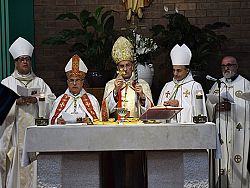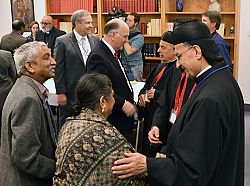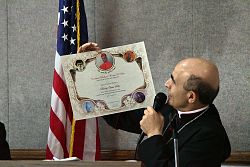Patriarch of Antioch and All the East celebrates Divine Liturgy in Utah

SALT LAKE CITY — Cardinal Bechara Boutros al-Rahi, the 77th Patriarch of Antioch and head of the Maronite Catholic Church, visited Utah on Oct. 20. His Beatitude is based in Lebanon; his itinerary in the United States includes stops at various Maronite parishes and the In Defense of Christians summit in Washington, D.C. He also was to visit the Cathedral of St. Patrick in New York for the inauguration of a shrine dedicated to Saint Charbel, a Maronite monk from Lebanon who was canonized in 1977.
“This shrine at St. Patrick’s cathedral is a sign of this good relationship between our church and the Catholic church in New York,” the cardinal said through a translator during an Oct. 20 press conference in the Pastoral Center of the Diocese of Salt Lake City.
The cardinal’s visit to Utah and other parts of the United States was a blessing not only to the Maronite communities but also to the faithful of the Diocese of Salt Lake City, said Bishop Oscar A. Solis.
“His Eminence came here as a shepherd, reaching out and tending the sheep entrusted to his pastoral care,” Bishop Solis said. “He mentioned that 50 percent of the population of Lebanon is scattered in many countries all over the world. As a conscientious spiritual leader, he goes around to visit them in order to re-establish their connectedness to their motherland and to their mother Church. It is a manifestation of his fatherly concern for his children, seeing to it personally that the spiritual needs of his flock are attended to. Pope Francis himself exhorted all priests and Church leaders to go out and proclaim the Gospel to the peripheries. It is inspiring to see the patriarch taking the time to meet and get to know the Maronite communities all over, and to be able to bring to them the Good News of God’s love and salvation. His presence, interaction and conversation with his flock is a beautiful and inspiring sign of unity and solidarity in faith, hope and love.”
The bishop said that, as an immigrant himself, he knows how good it feels to celebrate traditions with countrymen, to interact with them, to get news about their motherland, and “most of all to get excited being together as a community ‘away from home.’ Such occasions can counter feelings of homesickness as well as a boost their spirits, and that hopefully leads to renewal of our faith,” Bishop Solis said.
Hosting the cardinal “reminded me not only of my own sacred and pastoral responsibility, but it was also a great moment to witness the joy of the people of God gathered as a faith community, as a Church,” he said. “We are all grateful for the visit, as he brought God’s blessings to the community of the Maronite Catholic Church in Utah and to the Diocese of Salt Lake City, too.”
At the Pastoral Center, the cardinal also visited with members of the Salt Lake Interfaith Roundtable and answered a few questions about conditions of Christians in Lebanon. He also spoke about how the country is handling the influx of refugees who are fleeing the violence in neighboring Syria.
The refugee population in Lebanon is about 2 million, almost half that of the native population. Attempting to provide for the refugees strains the country’s political, economic and social services infrastructures, Cardinal Boutros al-Rahi said.
Rabbi Ilana Schwartzman of Congregation Kol Ami in Salt Lake City said she attended the meeting with the cardinal because she thought it would help with interfaith efforts, “and because I think it’s always good to hear from other people and so that we can learn a new perspective.”
The rabbi said she knows the Middle Eastern perspectives about Israel very well, but a Christian Lebanese perspective is very different for her, and she thinks that learning about different traditions and perspectives helps her appreciate other people. In addition, she said she thinks there is much to learn about Lebanon’s handling of the influx of refugees.
“I think we have a lot to think from that, both as people of conscience who like to think about other people as children of God and want to take care of them, and also from a political standpoint, of what does it mean to live in a country that certainly is not going to take in double its size in refugees,” Rabbi Schwartzman said.
After the meeting with interfaith leaders, Cardinal Boutros al-Rai celebrated the Divine Liturgy at St. Vincent de Paul Catholic Church in Salt Lake City. Concelebrants included Bishop Solis; Archbishop Paul Nabil Sayah, patriarchal vicar general for foreign affairs, who was accompanying the cardinal; Bishop A. Elias Zaidan, Bishop of the Eparchy of Our Lady of Lebanon of Los Angeles; Chorbishop William J. Leser, a former administrator of St. Jude Maronite Parish; Father Joubran BouMerhi, the parish’s pastor; and numerous priests of the diocese.
In his homily, the patriarch reflected on the reading from 1 Cor 4:1-13, saying that, “As servants, we are called to remain vigilant, faithful, so when the time for judgment comes we will be found without blemish.”
Then, commenting on the Gospel from Mk 4:26-29, the cardinal compared the Parable of the Growing Seed to the growth of the Kingdom of God. Catholics receive the grace of God at baptism, but “it is our responsibility to cultivate the ground, in order for the seed to grow, prosper and bear fruit,” he said, speaking in English. “We are called to nurture the grace we have received by prayer, reading of the Scriptures, practicing the virtues and living life that is worthy of the calling that we received. … May this preparation inspire us to examine our consciences, to confess our sins, to renew our faith in God and our love of God, to reconcile with our brothers and sisters, to reach out to the people on the outskirts of life and society, and to practice deeds of charity on a daily basis.”
He also called on all those present to renew their faith in God and their commitment to the Church.
At the reception following the Mass, Cardinal Boutros al-Rahi said his visit was meant to reassure the 100 families of the local Maronite Church “of our love, and to [encourage] you to continue in your efforts to keep the faith, the faith of St. Maron, alive among those that look to him and to his disciples for inspiration and guidance. … I assure you, you are never forgotten. You are a vital part of our Maronite Church, and through your hard work and effort you will continue to accomplish great things and keep our Maronite faith, traditions and culture alive for future generations in this part of the land.”
Through a translator, the cardinal gave an overview of his perspective of the situation in the Middle East, where Muslims and Christians have lived together for centuries but now are threatened by terrorist groups who fight in the name of Islam, he said. Despite this threat, “As Christians we are committed to remain in the Middle East, to carry the gospel of life, the gospel of love, the gospel of peace,” he said, and asked those present to pray for the Maronites and for peace in the Middle East. He also asked them to “tell the people in charge” that there have been enough wars, enough destruction, and to say that they want peace in the Middle East.
The cardinal’s visit to Utah was a blessing, said Elie El Kessrwany, a Lebanese Maronite who attended the reception.
“We’re very happy to be able to share and celebrate his visit, and we feel very blessed to be able to participate with other Lebanese and other Catholic members of the community here, so we share this community together,” El Kessrwany said.
© Copyright 2025 The Diocese of Salt Lake City. All rights reserved.



Stay Connected With Us